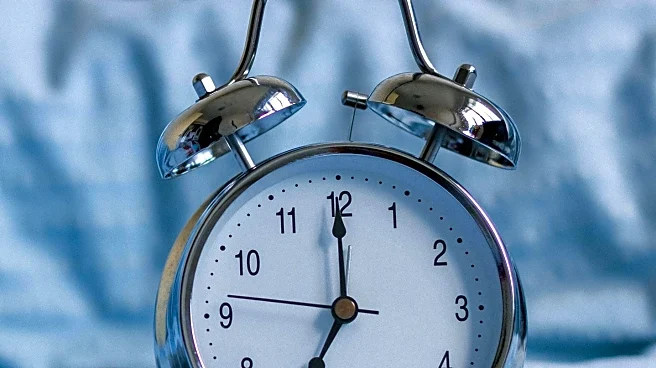What is the story about?
What's Happening?
A recent study has highlighted the significant impact of poor sleep on brain health, revealing that individuals with inadequate sleep patterns have brains that appear older than their chronological age. Conducted on over 27,000 UK adults aged 40 to 70, the research utilized advanced brain imaging and artificial intelligence to estimate brain age based on MRI scans. The study identified five key sleep characteristics: chronotype, sleep duration, insomnia, snoring, and daytime sleepiness. Participants with poor sleep profiles exhibited brains that appeared nearly a year older than expected. The research suggests that poor sleep may accelerate brain aging through increased inflammation and impaired glymphatic system function, which is responsible for clearing waste from the brain.
Why It's Important?
The findings underscore the critical role of sleep in maintaining brain health and preventing cognitive decline. As the study links poor sleep to faster brain aging and increased dementia risk, it highlights the need for public health initiatives to promote better sleep hygiene. This research could influence healthcare policies and encourage the development of interventions aimed at improving sleep quality. Individuals with poor sleep habits may face heightened risks of neurological conditions, emphasizing the importance of addressing sleep issues to enhance overall health and longevity.
What's Next?
The study's implications suggest a need for further research into sleep interventions that could mitigate the effects of poor sleep on brain aging. Healthcare providers may consider incorporating sleep assessments into routine check-ups and recommending lifestyle changes to improve sleep quality. Public health campaigns could focus on educating the public about the benefits of good sleep hygiene and the risks associated with sleep deprivation. Additionally, the development of digital tools and technologies to monitor and enhance sleep could become a priority for researchers and tech companies.
Beyond the Headlines
The study opens discussions on the ethical and societal implications of sleep health, particularly in how it affects aging populations. As sleep is a modifiable behavior, there is potential for significant public health improvements if effective interventions are widely implemented. The research also raises questions about the role of technology in sleep management, as digital tools could offer personalized sleep coaching and monitoring. However, the reliance on technology must be balanced with privacy concerns and the potential for increased screen time to negatively impact sleep.














